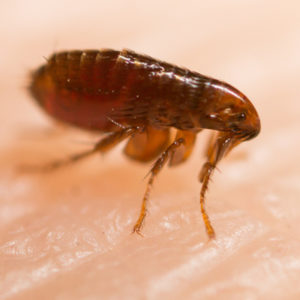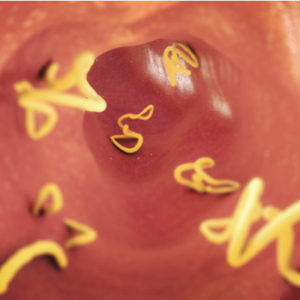Colder days and shorter nights are upon us. This may make it seem like we are finished dealing with pests, but in the case of some, particularly fleas, this is certainly not the case. Because fleas are parasites and latch onto the backs of our beloved pets, they may already be inside your home and laying eggs. Don’t worry, these fall flea control tips will help protect you from a winter flea infestation.
Do Fleas Go Away in the Fall and Winter?

Here in Massachusetts, the most common flea is the cat flea. Like all fleas, they are parasites and feed off the blood of your pets. They prefer to feed on cats, but they can live on other mammals such as raccoons, mice, rats, and dogs. Because they have the ability to jump up to six inches at once, this makes it easy for them to hitchhike on the backs of animals as well as gain access to your home. In the fall, when pets get their winter coats, fleas find a cozy home in the thicker fur. The thicker coat protects them from discovery and from being easily brushed away.
Once they find an animal to latch onto, they will stay there for as long as possible. Female fleas will start laying, eggs within 24 to 36 hours, and lay up to 50 eggs per day for three months. They disperse these eggs in your carpet, on your sofas, beds, and in various other areas of your home wherever your pet spends most of their time.
Once the eggs hatch, they feed on the digested blood left behind by adult fleas. In about one or two weeks, the larvae spin a cocoon which can last up to a year. They wait for the ideal environment in which to thrive before emerging.
Are Fleas Dangerous?
For humans, flea bites are itchy, can be irritating, and can even cause infections. Fleas can also cause infection and illness in your pets. The three diseases that fleas cause in humans are:
Murine Typhus
While murine typhus is rare, rats infected with fleas are often carriers, and occasionally cats will come into contact with infected fleas. Humans can get infected through flea bites. Symptoms include fever, headache, body aches, nausea, and a rash on the arms and legs. If caught early, murine typhus is treated with antibiotics, but because the symptoms are similar to other illnesses, a delay in treatment can lead to a more severe infection.
Mycoplasma haemofelis
Mostly transmitted from fleas to cats, Mycoplasma haemofelis is a parasitic, bacterial disease that, while rare, has been found in humans with compromised immune systems. Treatment for both humans and cats involves antibiotics.
Tapeworms

Fleas can become infected with tapeworms, and then pets accidentally swallow infected fleas. While humans do not typically eat fleas, if a small child accidentally swallows one, they too can obtain a tapeworm. In most cases, the tapeworm is treatable with medication.
What Can I Do to Prevent Fleas?
Fleas are persistent pests that require year-round vigilance. Pet owners should take the necessary steps to protect their pets and homes from these biting creatures. Minimizing the risk of a flea infestation is possible with fall flea control. While it’s best to call in the professionals for a flea infestation, there are a few ways you can combat and prevent an infestation.
- Vacuum and clean any area where your pets spend a lot of time, including where it sleeps and eats.
- Clean everything your pet uses. This can include toys, sheets, blankets, and beds.
- Regularly check your pets for fleas. If necessary, consult your veterinarian on the proper treatment and prevention methods.
Easy Flea Control Tips Include:
Fall and winter are the best times to rid your home of fleas, as during this time, the development process of the flea is slowed, making them an easier target and less complicated to exterminate.
Call in the Professionals
If you need help with your fall flea control, then call in the professionals. Pest Control Unlimited can help eliminate these annoying, disgusting pests from your home or commercial property. Our residential treatments include both one-time and quarterly program visits, depending on your needs and the state of your property. Our commercial pest management will ensure your customer’s safety while allowing you to run your business.
Learn more by calling us now at 888-649-9919 or filling out our form online. Follow us on Facebook and Twitter to keep up to date on the latest news and deals.

